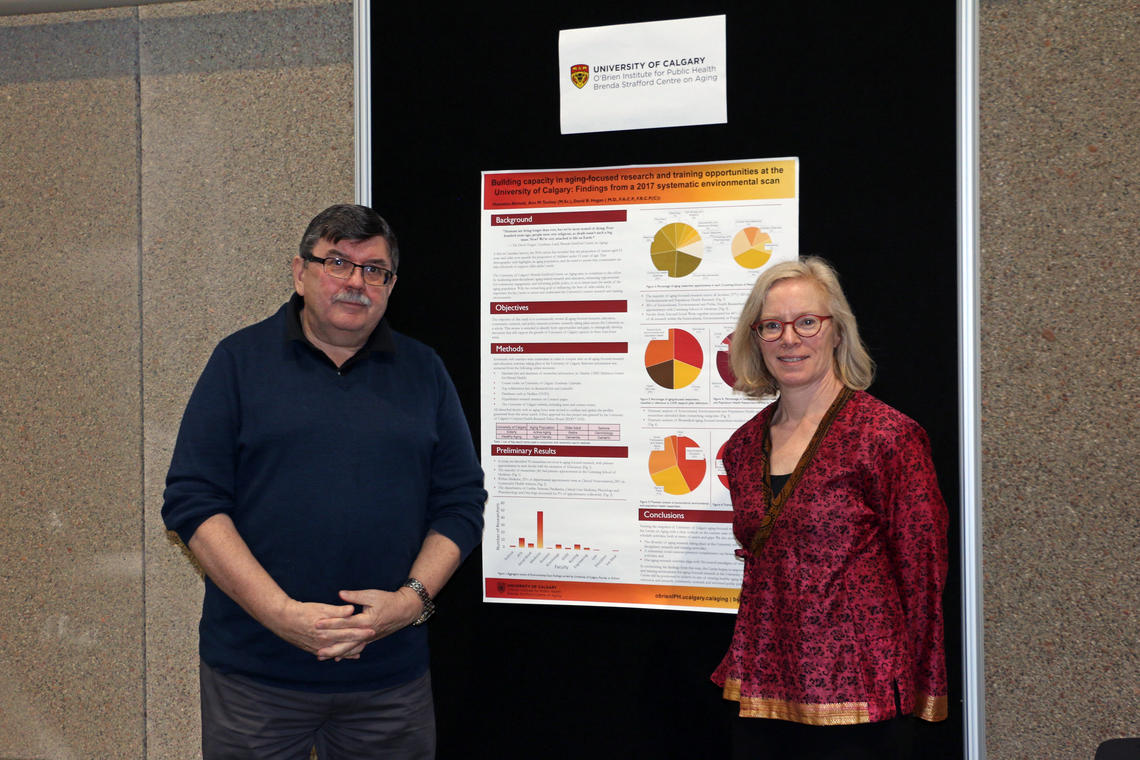Dec. 17, 2021
Brenda Strafford Centre explores how age-friendly universities can contribute to age-friendly societies

As the Brenda Strafford Centre on Aging marks its first decade in operation, it is swiftly becoming one of the preeminent institutions supporting aging research and education in Canada.
Operating as a program within the O’Brien Institute for Public Health at the Cumming School of Medicine (CSM), the Centre on Aging promotes and supports interdisciplinary, relevant and impact-focused aging research and education.
“The Centre on Aging is a hub of hubs for aging research at the University of Calgary and beyond,” says Dr. Tom Stelfox, MD, PhD, O’Brien Institute scientific director.
“By bringing together exceptional scholars from across disciplines they are leveraging interdisciplinary scholarship to tackle the big questions and challenges of aging,” he says.
Established in 2011 to foster aging-related work at UCalgary, the Centre on Aging’s reach extends beyond academia and into the community.
“Calgary has a really vibrant aging community and it's very rewarding to explore ways in which the Centre on Aging can contribute to that community through knowledge mobilization,” says Dr. Ann Toohey, PhD, Centre on Aging research and scientific programs manager, an adjunct assistant professor in the Department of Community Health Sciences and a member of the O’Brien Institute.

David Hogan, left, and Ann Toohey at an O’Brien Institute for Public Health event in 2019.
Working with the community, the Centre on Aging strives to achieve one of its core values — the equitable, inclusive and meaningful involvement of older adults in the research, teaching, learning and community outreach activities of the centre and the university as a whole.
“Traditionally, older adults were viewed only as participants in studies on aging, but we believe they should be involved all the way through the process. This is very much in the DNA of our centre — ensuring that the voice of older adults is listened to,” says Dr. David Hogan, MD, a professor in the departments of Medicine and Community Health Sciences, and a member of the O’Brien Institute and the Hotchkiss Brain Institute at the CSM.
This work is receiving national recognition.
Recently, the Centre on Aging was selected to host the Canadian Institutes of Health Research (CIHR) Institute for Aging 2022 Summer Program in Aging, a prestigious national training program designed for Canada’s top graduate and postdoctoral trainees.
The 2022 Summer Program in Aging will focus on dementia and other cerebrovascular diseases in aging, a major public health issue as the Canadian population ages, says Hogan, a nationally recognized researcher in the clinical aspects of dementia.
Ensuring the health of future generations
As Canadians age, the science and understanding of this population's needs also must expand and evolve, says Hogan.
In August, the Canadian government renewed its support for the largest, most comprehensive research platforms on aging in the world, the Canadian Longitudinal Study on Aging (CLSA), with a $61.5 million investment.
“The aim of the CLSA is to find ways to help us live long and live well, and understand why some people age in healthy fashion while others do not," says Hogan, who, along with Dr. Jacqueline McMillan, MD, are leading the Calgary site which is following over 2,500 CLSA participants.
Recognizing the importance, as well as challenges, in maintaining Calgary’s local CLSA data collection site, the Centre on Aging has contributed financially to support it, and is already putting the data to work, says Hogan.
The Centre on Aging has used CLSA data to support the Age-Friendly Calgary municipal strategy, investigate the impact of the 2013 Alberta flood, and collaborate with national colleagues in a cross-country study comparing the age-friendliness of municipalities with CLSA data collection sites.
Building on the age-friendly theme, in 2019 the Centre on Aging helped to secure an Age-Friendly University designation for UCalgary by joining the Age-Friendly University Global Network, a group of higher education institutions that have committed themselves to becoming more age-friendly in their programs and policies.
New leadership for a new decade
Remembering the investment older adults have made in society is something that inspires the Centre on Aging to keep pushing for inclusivity.
“We tend to forget the contributions older people have made and continue to make, and view their appropriate use of health-care resources as burdensome,” says Toohey. “Every one of us is aging and it benefits us all to consider quality of life and inclusion across the lifespan.”
“When discussing the success of the Centre on Aging, and the tremendous achievements it continues to accumulate, the leadership of Dr. David Hogan, MD, must be acknowledged as a key part of that success,” says Stelfox.
A specialist in geriatric medicine, Hogan, who is completing his final term as Centre of Aging academic lead, has devoted his career to improving health care and quality of life for older adults.
“We are so fortunate to have had Dr. Hogan lead the Centre on Aging through its first decade. His purposeful and thoughtful leadership has helped build a nationally recognized institution,” says Stelfox.
The Centre on Aging is recruiting a leader to take over from Hogan as he completes his second leadership term, and to guide the centre to a second decade of health impact. More details on the academic lead position can be found here.
Jacqueline McMillan is a clinical assistant professor in the departments of Medicine and Community Health Sciences at the Cumming School of Medicine, and a member of the O’Brien Institute for Public Health.





